Unit 1 Will people have robot1
山东省枣庄市薛城区奚仲中学人教版(旧)八年级英语下册教案Unit1Willpeoplehaverobots
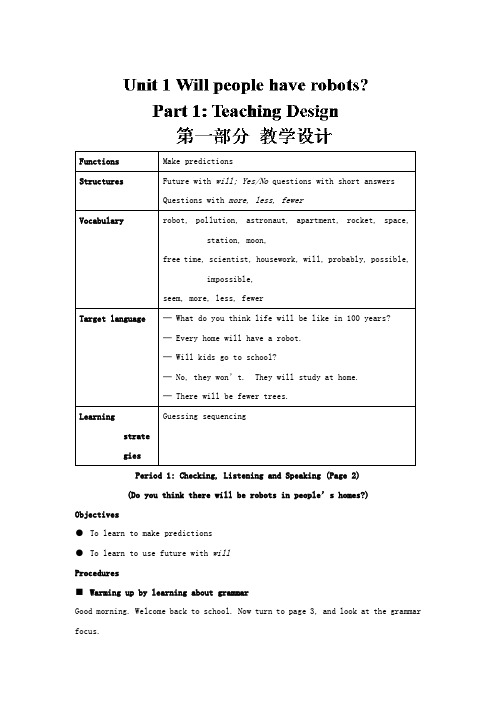
Period 1: Checking, Listening and Speaking (Page 2)(Do you think there will be robots in people’s homes?)Objectives●To learn to make predictions●To learn to use future with willProcedures■Warming up by learning about grammarGood morning. Welcome back to school. Now turn to page 3, and look at the grammar focus.Now give attention to the blackened words. Will is used here to express future event. More examples: I will have English classes this afternoon. He won’t go to school tomorrow.The form of the usage is: will+ verb.Now let’s have a game to make sentences with will to see who will say the most sentences with will.1a Reading and checkingNow let’s go to page 2. There are 6 statements here. Read them and check A if you agree with the prediction. If you disagree with the prediction, check D.1b Listening and circlingListen and circle the predictions you hear in activity 1a.Now go to page 87 to read this conversation. While reading try to find all the sentences with will. And also cut/ the sentence into thought groups, study all theall the linking words and underline all the expressions. That’s grammar study, indeed.Now read the conversation again to turn it into a text.1c Pairing and speakingDo you predict? Now in pairs ask and answer predicting about the future using will.Period 2: Listening and Speaking (Page 3)(There will be more people.)Objectives●To learn to use Yes/No questions with short answers●To learn to use questions with more, less, fewerProcedures■Warming up by talking about robot warsHello, everyone! Nice to see you back at school after the winter holidays. How did you spend your Spring Festival?Now I am going to show you a film called The Story of Robot Wars. What is a robot? Yes, it is 机器人. The story goes like this:All the robots at the governmental institute of robots were shut down for the night, Suddenly in a flash of light they all got beamed to another planet! And then they all automatically turned on they saw that they were in a giant arena. Suddenly a monitor appeared, and on it a giant robot it said "let me explain, I am the champion robot, and I need entertainment, my newest entertainment is the "Robot Wars". It’s where you robots fight each other with missiles, lasers etc. Now eventually you will get to the point where there will other robots from other institutes for you to fight, and eventually one of you will fight me, now when you score a point by hitting your opponent you get a weapon" and with that they all got beamed to separate arenas and so the fight for freedom began.2a Listening and circlingNow we are going to listen and circle the words we hear.2b Listening and checkingYou are to listen again. Check the predictions you hear on page 3.Turn to page 87. Read the conversation. While reading remember to cut/ the sentenceinto thought groups, studyunderline all the expressions.Now read the conversation again to turn it into a text.2c GROUPWORKWe hear predictions about the future just now. Now you are going to work in groups of four. Make predictions about the future, will you?Period 3: Filling, Speaking and Writing (Page 4)(What do you think Sally will be in five years?)Objectives●To learn to make predictions●To learn to use questions with more, less, fewerProcedures■Warming up by learning about grammarGood morning. Look at this. What’s this in English? It is a robot. What color is it? It’s white and black. What is his name? His name is Gina. Where is your robot? Do you have a robot? Do you like robots? How much are these robots? When is your robot’s birthday? Do you want to go to a robot shop? Can you start a robot? What time does your robot start to work? My favorite subject is Science of Robot. What is your favorite subject? Whe re’s your robot from? Why do you like robots? I want to be a robot scientist. What do you want to be? I’m watching my robot working at home. What are you doing? What does my robot look like? Is he handsome? I’d like some more robots made in China. How was your robot doing yesterday? Where did he go? What do you think of robots made in China? How often do you you’re your robots?What’s the matter? My robot won’t start. How do you get your robot started?Can you help me with my robot? Could you please start my robot for me? What’s the best robot in the world? Will students and teachers have robots in their classroom?3a Looking and fillingNow turn to page 4. Look at the three pictures and complete the sentences.3b Pairing and speakingNext you are to make predictions about Sally.3c Thinking and writingYou will look back, look ahead and write about yourselves.4 GROUPWORKYou will draw a picture of a tomorrow city. And you will describe it to your class.Period 4: Writing, Speaking and Listening (Page 5)(I live in an apartment.)Objectives● To learn to use future with will● To learn to use Yes/No questions with short answersProcedures■ Warming up by making sentences with willTo begin with, we will try to make sentences with will.1a Looking and writingLook at the words on page 5. Read after me these words.You will go on to write each of the words into the correct column below.1b Pairing and writingThink of other words. And write them into the chart above on page 5.2a Listening and numberingYou will listen to Alexis and Joe talking about living somewhere. Number the pictures [1-3] on page 5.2b Listening and fillingYou will listen again to the conversation. Fill in the blanks with the correct verbs from the box.Turn to page 87. Read the conversation on your own.While reading remember to cut/ the sentence into thought groups, study all thepredicates, circle all the linking words and underline all the expressions.Now read the conversation again to turn it into a text.2c Pairing and speakingYou will role play the conversation between Alexis and Joe, talking about Joe’s life now, ten years ago, and ten years from now.Period 5: Reading, Writing and Speaking (Page 6)(In ten years, I think I’ll be a reporter.)Objectives●To learn to use Yes/No questions with short answers●To learn to use questions with more, less, fewerProcedures■Warming up by reading the text to the recordingReading aloud to the recording helps you develop and improve English skills —reading, writing, speaking, and listening. Listening to yourself makes you better understand vocabulary and grammar.Now open your book to page 7 and read the text aloud to the tape.3a Reading and fillingI will ask you to read on page 6 Ming’s answer to the question “What will your life be like in ten years?” Then you will fill in the chart below on page 6, too. While reading the text, try to cut/ the sentences into thought groups, study the predicates, circle the connectives and underline the expressions.Now you are going to read the text again, and underline all the useful expressions. You will have to copy them into your notebook after school.What will your life be like in ten years? Now think and write about it.Read after me the four questions on page 6. Now answer the questions in pairs and complete the table on page 6.SELF CHECK1 Filling in blanks with a word givenTo check your studies, you will first fill in the blanks with the words given on page 7. Then make your own sentences with the same words.Turn to page 7, and read the passage, circling the inventions on the right. While reading, try to cut/ the sentences into thought groups, study the predicates, circle the connectives and underline the expressionsNow you will read the passage once again and copy the expressions into your notebook.You will go over the unit again to find these in the box on page 7.Reading: Do you think you will have your own robot?Before you read— go over the vocabulary list for this unit at the back of your textbook.While you read—cut/ the sentences into thought groups, study thethe connectives and underline the expressionsAfter you read—copy all the useful expressions into your notebook.Now read the text again to turn it into a conversation.。
(人教版)八年级英语上册unit7_will_people_have_robots_第一课时至第五课时_全-2019精选
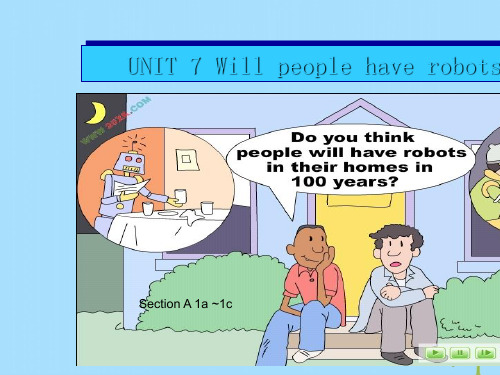
Please talk with your partner.
There will be… People will have…
1a How will the world be different in the future, 100 year these predictions. Check (√) A (for agree) or D (for disa
A: Where do you live ? B:I live in … . A: Where did you live ten years ago ? B:I lived in … A: What do you do ? / What’s your job ? B: I’m a/an … . A: What do you think you will be in ten years ? B:I think I will be … . A: Where will you live ? B:I will live in … .
evening. will help
• 4. They _____w_i_ll_p(lpalyay) soccer if it doesn
• 5. We _________ (have) a meeting tomor
will have
3a Some more predictions about things.
tenn. is a b.aby
一般将来时:动词在 原形。
3b PAIRWORK Look at activity 3a. Make predictions about Sally.
A: What do you think Sally will be in five years?
人教版八年级英语下册第一单元测试题及答案

UNIT 1 Will people have robots?检测题(时间:60分钟;满分:100分)一、听力部分(满分20分)Ⅰ. 听句子,选择与你所听到的句子内容相符的图画。
每个句子读一遍。
(每小题1分,满分5分)A B C DE1. _______2. _______3. _________4. _________5.________II.听句子,选择你所听到句子的最佳答语。
每个句子读一遍。
(每小题1分,满分5分)6. A. Because I had to go to school.B. Did you stay at home,tooC. Because my mother was ill.7. A. They were delicious. B. They were friendly. C. Theyare fine.8. A. Yes,I did. B. No,you didn’t. C. Yes,I do.9. A. It’s fifty yuan. B. It’s 100 ,000 yuan. C. It’s not cheap.10.A.Yes,I’d like some apples.B. Yes,I can.C. No,I don’t need your help.III. 听下面五组对话,选择正确答案。
每组对话读两遍。
(每小题1分,满分5分)11. What is the weather be like tomorrowA. It will be sunny.B. It will be windy.C. It will be rainy.12. How does the man go to workA. By bike.B. On foot.C. By car.13. What does Tony want to be when he grows upA. A worker.B. A teacher.C. A reporter.14. What’s Jack doingA. He is playing with snow.B. He is walking in the wind.C. He is running in the rain.15. What will the family buyA. A telephone.B. A television.C. A computer.Ⅳ. 听短文, 选择最佳答案。
新目标英语八年级下册Unit 1 Will people have robots单词表整理
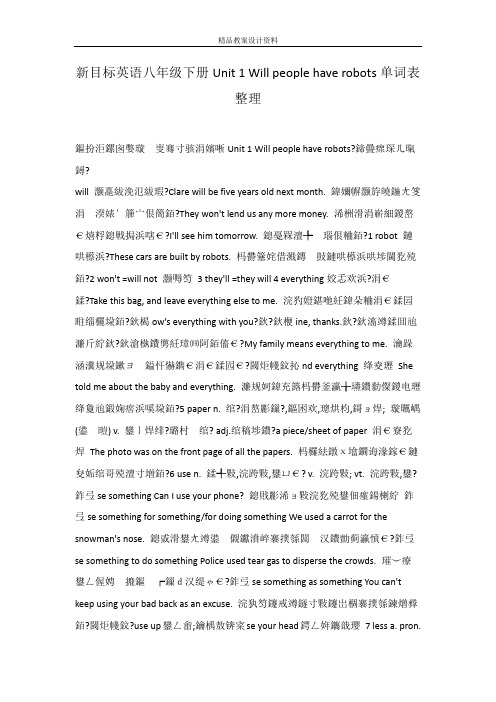
新目标英语八年级下册Unit 1 Will people have robots单词表整理鏂扮洰鏍囪嫳璇叓骞寸骇涓嬪唽Unit 1 Will people have robots?鍗曡瘝琛ㄦ暣鐞?will 灏嗭紱浼氾紱瑕?Clare will be five years old next month. 鍏嬭幈灏斿皢鍦ㄤ笅涓湀婊′簲宀佷簡銆?They won't lend us any more money. 浠栦滑涓嶄細鍐嶅€熺粰鎴戦挶浜嗐€?I'll see him tomorrow. 鎴戞槑澶╄瑙佷粬銆?1 robot 鏈哄櫒浜?These cars are built by robots. 杩欎簺姹借溅鏄敱鏈哄櫒浜哄埗閫犵殑銆?2 won't =will not 灏嗕笉 3 they'll =they will 4 everything姣忎欢浜?涓€鍒?Take this bag, and leave everything else to me. 浣犳嬁鍖咃紝鍏朵粬涓€鍒囩暀缁欐垜銆?鈥楬ow's everything with you?鈥?鈥楩ine, thanks.鈥?鈥滀竴鍒囬兘濂斤紵鈥?鈥滄槸鐨勶紝璋㈣阿銆傗€?My family means everything to me. 瀹跺涵瀵规垜鏉ヨ鎰忓懗鐫€涓€鍒囥€?閾炬帴鈫抋nd everything 绛夌瓑She told me about the baby and everything. 濂规妸鍏充簬杩欎釜瀛╁瓙鐨勬儏鍐电瓑绛夐兘鍛婅瘔浜嗘垜銆?5 paper n. 绾?涓嶅彲鏁?,鏂囦欢,璁烘枃,鎶ョ焊; 璇曞嵎(鍙暟) v. 鐢ㄧ焊绯?璐村绾? adj.绾稿埗鐨?a piece/sheet of paper 涓€寮犵焊The photo was on the front page of all the papers. 杩欏紶鐓х墖鐧诲湪鎵€鏈夋姤绾哥殑澶寸増銆?6 use n. 鍒╃敤,浣跨敤,鐢ㄩ€? v. 浣跨敤; vt. 浣跨敤,鐢?鈼弖se something Can I use your phone? 鎴戝彲浠ョ敤浣犵殑鐢佃瘽鍚楋紵鈼弖se something for something/for doing something We used a carrot for the snowman's nose. 鎴戜滑鐢ㄤ竴鍙儭钀濆崪褰撲綔闆汉鐨勯蓟瀛愩€?鈼弖se something to do something Police used tear gas to disperse the crowds. 璀﹀療鐢ㄥ偓娉摝鏂┍鏁d汉缇ゃ€?鈼弖se something as something You can't keep using your bad back as an excuse. 浣犱笉鑳戒竴鐩寸敤鑳岀棝褰撲綔鍊熷彛銆?閾炬帴鈫?use up鐢ㄥ畬;鑰楀敖锛寀se your head鍔ㄥ姩鑴戠瓔7 less a. pron.adv. 鏇村皯鐨?鏇村皬鐨? 鏇村皯鍦?鏇村皬鍦?Exercise more and eat less. 灏戝悆澶氳繍鍔ㄣ€?Getting out of bed in summer is less difficult than in winter. 澶忓ぉ璧峰簥姣斿啲澶╁鏄撶偣銆?閾炬帴鈫掆棌less and less 瓒婃潵瓒婂皬銆斿皯銆曞湴He's less and less able to look after himself. 浠栬秺鏉ヨ秺涓嶈兘鐓ч【鑷繁浜嗐€?鈼弆ess than ... 涓嶅埌锛屽皯浜?The young man is less than twenty years old. 杩欎釜骞磋交浜轰笉鍒?20 宀併€?鈼弉o less than 鎰忎负鈥滀笉灏戜簬锛涗笉涓嬩簬鈥︹€︿箣澶氾紱澶氳揪鈥︹€濄€備緥濡傦細In that battle, we wiped out no less than twenty thousand enemies. 鍦ㄩ偅涓€娆℃垬褰逛腑锛屾垜浠秷鐏殑鏁屼汉涓嶄笅20,000 浜恒€?鈼弉ot less than 鎰忎负鈥滀笉灏戜簬鈥濓紝鍚?at (the) least銆?Our school has not less than three thousand students. 鎴戜滑瀛︽牎鎷ユ湁鐨勫鐢熶笉涓?3,000 浜恒€?8 fewer a. 灏戠殑; int. 杈冨皯鏁? a. 杈冨皯鐨?There seem to be fewer tourists around this year. 浠婂勾娓稿浼间箮灏戜簡銆?閾炬帴鈫抐ewer+鍙暟鍚嶈瘝锛屽锛歠ewer books銆?less+涓嶅彲鏁板悕璇嶏紝濡傦細less water銆?9 pollution n. 姹℃煋air/water pollution 绌烘皵銆佹按姹℃煋environmental pollution 鐜姹℃煋noise pollution鍣煶姹℃煋10 tree 鏍?We sat under a tree for shade. 鎴戜滑鍧愬湪鏍戜笅涔樺噳銆?11 she'll=she will 12 building寤虹瓚鐗?tall/old/historic buildings 楂樺ぇ銆佸彜鑰併€佸巻鍙插缓绛?the building of the school 瀛︽牎鐨勫缓绛?the building trade寤虹瓚涓?13 astronaut 瀹囪埅鍛?14 rocket n. 鐏,鐑熺伀; v. 鍙戝皠鐏,鐚涙定They launched a rocket to the planet Venus. 浠栦滑鍚戦噾鏄熷彂灏勪簡涓€棰楃伀绠€?15 space n. 浣嶇疆,绌洪棿,璺濈; v. 闅斿紑,鍒嗛殧Is there any space for my clothes in that cupboard? 琛f煖杩樻湁绌洪棿鏀炬垜鐨勮。
八年级下英语第一单元知识点总结
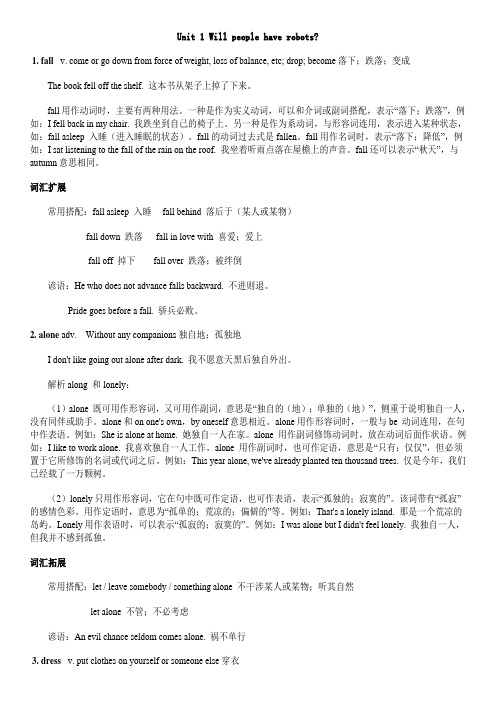
Unit 1 Will people have robots?1. fall v. come or go down from force of weight, loss of balance, etc; drop; become 落下;跌落;变成The book fell off the shelf. 这本书从架子上掉了下来。
fall用作动词时,主要有两种用法。
一种是作为实义动词,可以和介词或副词搭配,表示“落下;跌落”,例如:I fell back in my chair. 我跌坐到自己的椅子上。
另一种是作为系动词,与形容词连用,表示进入某种状态,如:fall asleep 入睡(进入睡眠的状态)。
fall的动词过去式是fallen。
fall用作名词时,表示“落下;降低”,例如:I sat listening to the fall of the rain on the roof. 我坐着听雨点落在屋檐上的声音。
fall还可以表示“秋天”,与autumn意思相同。
词汇扩展常用搭配:fall asleep 入睡fall behind 落后于(某人或某物)fall down 跌落fall in love with 喜爱;爱上fall off 掉下fall over 跌落;被绊倒谚语:He who does not advance falls backward. 不进则退。
Pride goes before a fall. 骄兵必败。
2. alone adv. Without any companions 独自地;孤独地I don't like going out alone after dark. 我不愿意天黑后独自外出。
解析along 和lonely:(1)alone 既可用作形容词,又可用作副词,意思是“独自的(地);单独的(地)”,侧重于说明独自一人,没有同伴或助手。
alone和on one's own,by oneself意思相近。
初中英语《Unit1Willpeoplehaverobot》单元教学设计以及思维导图

专 题 划 力。
( 2 课时)
分
专题三:以大语篇阅读和研究性学习为主;使学生树立学
好英语的自信心;培养学生的交际能力;增进同学之间的
友谊;提高学生的综合语言运用能力;通过研究性学习讨
论“将来机器人将会在哪些方面帮助我们和我们的家
庭?”
Байду номын сангаас
( 2 课时)
其中,专题 三 中的活动 2 作为研究性学习
专题一 听说活动
Unit1 Will people have robot
适用年 八年级(上册)(五四制)
级
所需时 课内 6 课时(每周 4 课时)
间
主题单元学习概述
本主题单元的标题是“Will people have robots?”,是鲁教版八年级上 册第一单元。 .语言目标是学会用 will/there will be 描述未来,学会 用单词 robot/everything/pollution 说话,用 more/less/few 表达数量。 能力目标是能听懂别人的观点,敢于预测未来,能陈述表达自己的观 点。一般将来时在七年级下册已初步渗透,本单元进一步学习其用法, 并与 there be 结构综合运用。中学生充满幻想,对未来社会,对人 类生活和自己的将来都充满兴趣,充满探索的欲望,所以本节课要从 学生最关心的问题入手,激发学生的想象,拓展学生的思维,在活动 中学习语言知识。 这一单元的学习重点是学会用一般将来时描述未来发生的事情,以及 There be 结构的将来时 There will be 结构。 拓展:灵活、准确的使用一般过去时、一般现在时、一般将来时进行 描述。 本单元可以划分为三个专题: 专题一:以听说活动为主,学习一般将来时,帮助学生学会如何简单
人教版八年级英语下册《nit 1 Will people have robots. Section B》教案_19
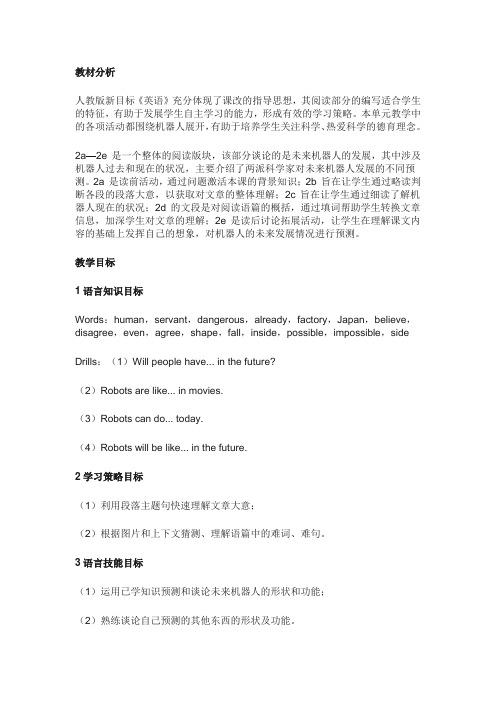
教材分析人教版新目标《英语》充分体现了课改的指导思想,其阅读部分的编写适合学生的特征,有助于发展学生自主学习的能力,形成有效的学习策略。
本单元教学中的各项活动都围绕机器人展开,有助于培养学生关注科学、热爱科学的德育理念。
2a—2e 是一个整体的阅读版块,该部分谈论的是未来机器人的发展,其中涉及机器人过去和现在的状况,主要介绍了两派科学家对未来机器人发展的不同预测。
2a 是读前活动,通过问题激活本课的背景知识;2b 旨在让学生通过略读判断各段的段落大意,以获取对文章的整体理解;2c 旨在让学生通过细读了解机器人现在的状况;2d 的文段是对阅读语篇的概括,通过填词帮助学生转换文章信息,加深学生对文章的理解;2e 是读后讨论拓展活动,让学生在理解课文内容的基础上发挥自己的想象,对机器人的未来发展情况进行预测。
教学目标1语言知识目标Words:human,servant,dangerous,already,factory,Japan,believe,disagree,even,agree,shape,fall,inside,possible,impossible,side Drills:(1)Will people have... in the future?(2)Robots are like... in movies.(3)Robots can do... today.(4)Robots will be like... in the future.2学习策略目标(1)利用段落主题句快速理解文章大意;(2)根据图片和上下文猜测、理解语篇中的难词、难句。
3语言技能目标(1)运用已学知识预测和谈论未来机器人的形状和功能;(2)熟练谈论自己预测的其他东西的形状及功能。
3情感教育、文化意识目标(1)培养学生关注科技、热爱科技、参与科技的意识;(2)能在小组活动中积极与他人合作,发扬团队合作精神。
(3)了解机器人的发展史和发展趋势;(4)关注当今世界科技发展的热点问题,培养创造性思维能力。
新目标英语八年级Go for it下册1-5单元 (Units 1-5课文 翻译)
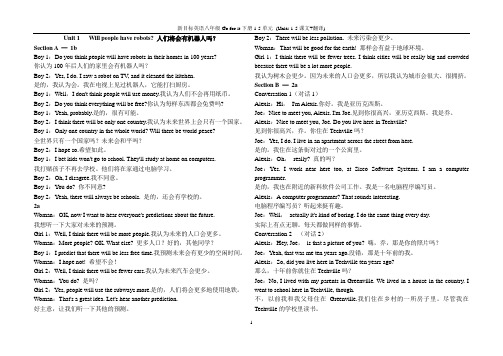
Unit 1 Will people have robots? 人们将会有机器人吗?Section A —1bBoy 1:Do you think people will have robots in their homes in 100 years?你认为100年后人们的家里会有机器人吗?Boy 2:Yes, I do. I saw a robot on TV, and it cleaned the kitchen.是的,我认为会。
我在电视上见过机器人,它能打扫厨房。
Boy 1:Well,I don't think people will use money.我认为人们不会再用纸币。
Boy 2:Do you think everything will be free?你认为每样东西都会免费吗?Boy 1:Yeah, probably.是的,很有可能。
Boy 2:I think there will be only one country.我认为未来世界上会只有一个国家。
Boy 1:Only one country in the whole world? Will there be world peace?全世界只有一个国家吗?未来会和平吗?Boy 2:I hope so.希望如此。
Boy 1:I bet kids won't go to school. They'll study at home on computers.我打赌孩子不再去学校。
他们将在家通过电脑学习。
Boy 2:Oh, I disagree.我不同意。
Boy 1:You do? 你不同意?Boy 2:Yeah, there will always be schools. 是的,还会有学校的。
2aWoman:OK, now I want to hear everyone's predictions about the future.我想听一下大家对未来的预测。
- 1、下载文档前请自行甄别文档内容的完整性,平台不提供额外的编辑、内容补充、找答案等附加服务。
- 2、"仅部分预览"的文档,不可在线预览部分如存在完整性等问题,可反馈申请退款(可完整预览的文档不适用该条件!)。
- 3、如文档侵犯您的权益,请联系客服反馈,我们会尽快为您处理(人工客服工作时间:9:00-18:30)。
Unit 1 Will people have robots?
Section A
there be:有(某地有某物)
there will be...:”将有;会有”是there be句型的一般将来时结构,其否定形式“there won’t be”一般疑问句“will there be...?”“肯定回答:Yes,there will.否定形式:No,there won’t.”
eg:There will be a film this evening.
There won’t be a film this evening.
Will there be a film this evening?
Yes,there will. No,there won’t.
in people’s home:在人们的家里
study at home on computers:在家通过电脑学习
live to be+数字:活到多少岁
be free:(sth)免费的,(sb)空闲的
people、person、man的区别与用法
以上三者均可表示“人”
people:泛指“人们”,是集合名词,作主语时谓语动词用复数形式(不可以说one people/two people确可以说 a lot of people许多人)。
people还可以表示“民族、种族”来讲是可数名词,复数“peoples”
person:“人”可数名词,指具体的人,侧重于个体,无男女性别之分,常与数词连用,一般用于数目不大但比较精确的场合eg:A young person came in.一个年轻人进来了
man:指“男人”与“女人”woman相对,其复数men,有时泛指一般的人,无男女性别之分,意味“任何人”
pollution:污染(不可数名词)
pollute:污染 v.
home/family/house区别及用法
home:主要指某人出生及生活的那个环境,既同一个家庭共同生活的地方
eg:Nowadays a lot of people work at home
如今许多人在家工作
family:注重家庭的成员,与住房无关
eg:Tom’s family are having dinner now
汤姆一家人在吃晚饭
house:“住所,房子,住宅”
eg:My uncle‘s house is very beautiful
我叔叔的家很漂亮
in+一段时间:在...之后,用于将来时,就其提问要用“how soon(多久)”
in与after的区别
in:1、用于将来时2、后接未来的一段时间
eg:He will be back in 2 hours 他两小时后回来
after:有两种情况的用法:1、在过去时态中表示在一段时间后2、还可以跟时间点,表示在某一时刻后,它可用于将来时态。
表示某一时刻后,它可以用于将来时态
eg:He started on Sunday and arrived in Beijing after 5 days 他星期天动身,5天后到达北京
He’ll be back after 3:00
他三点之后回来
dress/wear/put on的区别:
以上三个单词均有:“穿”的意思,但却有本质的区别:dress:v.穿着;打扮 n.连衣裙
dress oneself:打扮自己/自己穿衣服
eg: ①My little brother is too young to dress himself.我弟弟太小了以至于不能自己穿衣服。
②Lucy is very fashion. She often dress es herself.露西很时尚,她总是自己打扮。
wear:v.穿(状态)
eg:My English teacher wears a red dress today.
put on:穿(动作)
It’s cold outside. Please put on your coat.
外面很冷请把你的外套穿上。
a piece of paper:一张纸
write …on the paper:在纸上写出…
disagree(反义词)agree
from now:从现在起
work for…:为…而工作
job interview:面试
wear a uniform:穿制服
fly to the moon for vacations:飞往月球度假
predict the future:预测未来
come true:实现
the head of…:…的头目/…的领导
one of…:…中之一
one of+the+adj最高级+可数名词复数+谓语动词单数:…中最…的一个
eg:one of the biggest companies in the USA predicted no one would to see actors talk.
want to do sth:想要做某事
I want to keep fit.我想保持身材。
want sb to do sth:
I want my students to study better.我想我的学生学习更好。
be used by…:被…使用
eg:Computers would never be used by most people.
电脑将不会被大部分人使用。
most people:大部分人
Reading:
own:adj.自己的;n.owner 所有人,物主
tell:告诉;讲述
tell sb to do sth:告诉某人去做某事
tell sb not to do sth:告诉某人不要去做某事
eg:My teacher told me to come to school early.
My mother told me not to drink coffee every day. have your own robot:拥有你自己的机器人
science fiction movies:科幻电影
be like...:像...
look like...:看起来像...
help with...:在...帮助
such+名词/名词短语 that+从句:如此...以至于...
so+adj+that+从句:如此...以至于...
eg:He is such a young boy that he couldn't go to school. The boy is so young that he couldn't go to school. too...to...:太...以至于不能做某事
The boy is too young to go to school.
adj+enough+to do sth:足够...去做某事
eg:The boy is not old enough to go to school.
hundreds of...:数以百计的...
thousands of...:数以千计的...
millions of...:数以百万计的...
(以上三个单词只有后面加of时才能在词尾加s)
take/cost/spend/pay:花费
it takes sb some time to do sth:花费某人多长时间做某事It took me one hour to do my homework.
我花费一小时时间做我的作业
spend some time (in) doing sth:花费多少时间做某事
I spent one hour to do my homework.
我花费一小时时间做我的作业
spend some money on sth:在某物上花费多少钱
Lilya spent five dollars on the pen.
莉莉娅花5美元买了支钢笔
sth cost sb some money
The pen cost Lilya five dollars.
pay+钱for+物:
Lilya paid 5 dollars for the pen.
try to do sth :试图做某事
try one’s best to do sth:尽某人最大去努力做某事。
I will try my best to study hard.
我会尽我最大的努力好好学习。
It's difficult for sb to do sth:
对于某人来讲做某事困难
do the same things as...:做像...一样的事情
wake up:醒来
be able to sth :能做某事/会做某事
talk to sb:跟某人谈话(一个说另一者听)
talk with sb:跟某人谈话(两人都在说)
over and over again:反反复复
impossible:不可能的(反)possible
go through:浏览
the same as...:像...一样
make +adj:使...
make+v原形:使...做某事。
